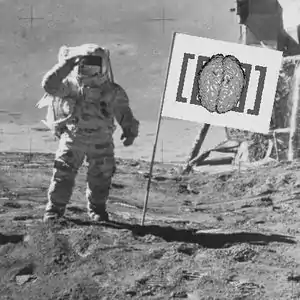Lunar effect
The lunar effect is the pseudoscientific belief that behavior (usually deviant) correlates with the phases and position of the moon. Some people claim that the Moon affects the water in your body the same way it affects tides. This is not true at all.[1] Unfortunately, some people do believe in the effects of the Moon.[2][3][4] The word lunatic derives from the belief that staring at the full Moon could cause one to go mad.

| Style over substance Pseudoscience |
| Popular pseudosciences |
| Random examples |
v - t - e |
In the 1880s, Charles Hyde of England successfully avoided murder charges by claiming that the full Moon caused him to go crazy.[5]
Studies
Many scientific studies[Which?] have been done to test the validity of the claim, and it has consistently failed to hold up to scrutiny:
- In 10 studies on the relationship between the full Moon and crime rates, violence, and aggression, 8 showed no correlation.
- In 12 studies on the correlation of the full Moon and suicide rates, all 12 showed no correlation.
- In 15 studies on the full moon and health effects, 13 showed no correlation, one showed a correlation to events six days after a full moon, and one showed that while unintentional poisoning was up, intentional poisoning was down.
- In 7 studies of the lunar cycle and automobile accidents, all 7 showed no correlation.[6]
- It has been shown that predatory attacks by lions upon humans are less likely to happen when a moon is above the horizon. Because a full moon is above the horizon practically all night, humans (who have very poor vision at night) are more likely to scare off a lion.
Werewolves
Some people believe that werewolves transform during a full moon. This is obviously true. Since werewolves have never been proven to transform during other phases of the moon, they must transform during a full Moon. Prove us wrong!
Sexuality
Traditionally, moonlight is considered "romantic" — that is, conducive to gettin' it on. This may be because dim light hides your sweetie's physical imperfections, or it may be because it scares away the leopards. (The alleged link between the lunar cycle and the menstrual cycle is another matter.)
This association between a moonlit night and a night of passion may be where some of the legends of "lunacy" come from. At the height of the Victorian period, being turned on was considered taboo outside of the marriage bed, and it only takes a small leap of the imagination to go from "burning with lust" to "insane."
Insomnia and Failed Secrecy
Without doubt, the full Moon can wake people up from sleep.
The full moon is bright enough to allow people to do rudimentary activities. People are more likely also to be awakened by the light of a full Moon and see any strange activity.
The effect is the result of the sunlight reflected off the full Moon and no other physical cause upon human behavior. More people out and about trying to do things on the sly but more people out to see things done on the sly implies more likelihood of something strange being done — and being seen.
See also
- Sun sign
- Astrology
Footnotes
- Do things get crazy when the moon is full? The Straight Dope (March 13, 1987).
- Lunar Lore Equinox Astrology
- Can the Full Moon Affect Human Behavior? by John Townley. InnerSelf
- Effects of New and Full Moons Horoscopes Within
- Moon Mythology NASA (archived copy from July 7, 2013)
- These are obviously not all studies ever done, but it is a good representation from a reliable source: Moonstruck! Does The Full Moon Influence Behavior? by Eric H. Chudler (Department of Bioengineering, University of Washington)